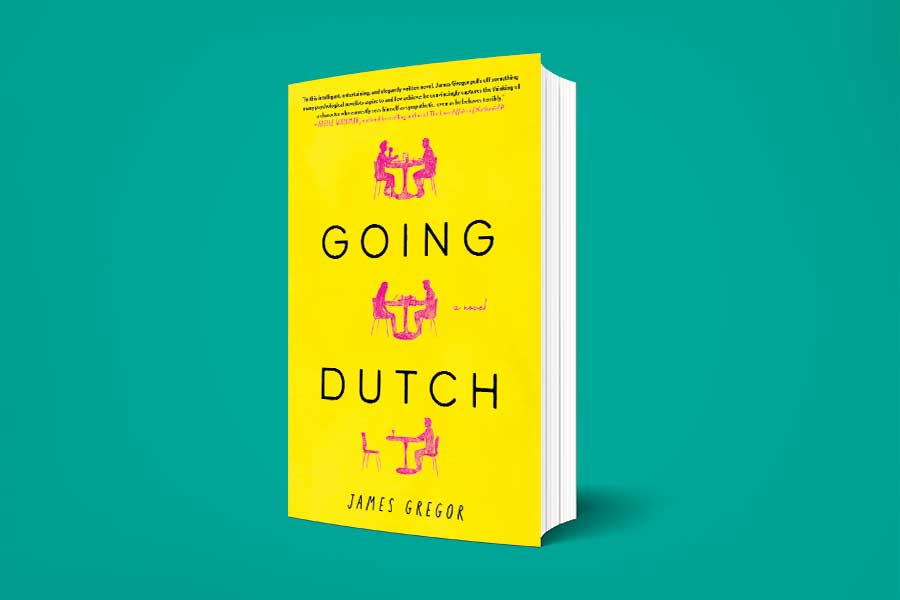Richard, the hero of James Gregor’s captivating debut novel, “Going Dutch” (Simon & Schuster, 2019), is a queer, 20-something graduate student pursuing a PhD in medieval Italian literature. Richard suffers from crippling writer’s block and, as a result, is in peril of losing his funding.
His academic challenges distract Richard from other issues regarding money, housing and love. Even with the foundation grant he receives for his research, he is almost always close to broke. An uncomfortable roommate situation makes his Brooklyn apartment claustrophobic, and he has to move. His love life is a mess. Richard is infatuated with his unavailable best friend, Patrick, but he also becomes romantically involved with both Blake, a young man he meets online, and Anne, a smart fellow graduate student in his department.
“Going Dutch” is a compelling, page-turning drama of self-destruction. Richard may be selfish or unlikeable — especially when he denies the truth or acts defensive — but Gregor engagingly depicts Richard’s clumsy navigation of both his professional and personal life.
As Richard and Anne become friendly, she helps him with his research by writing papers with — but actually for — him. While their “collaboration” is a bad decision, they each get something out of it. Richard is able to stay afloat academically and financially, and he genuinely likes Anne. Anne gets the companionship she desires.
On a trip to a conference in Montreal, Anne and Richard sleep together. In a scenario right out of a romance novel, the pair are forced to share a bed in a hotel room, which eventually leads, one drunken night, to fumbling and passion (sex), as well as some added complications — mostly stemming from Richard simultaneously seeing the irresistible Blake. There is an unwritten rule that when someone long single finally gets into a relationship, another relationship opportunity will inevitably arise.
“Going Dutch” does not delve too deeply into Richard’s bisexuality. The protagonist never carefully contemplates his sexual relationship with Anne — a missed opportunity, perhaps. His relationship with her seems to come more from the benefits he receives than from true, romantic love. Gregor lets readers connect those dots and puzzle out the emotions. This is his choice as the author, but it would have been richer to more directly address Richard’s sexual fluidity. Instead, Gregor uses the two relationships to build tension, as Richard struggles to conceal the other relationship from each of his lovers. This means that Richard must text Anne while he is on a meet-the-parents date with Blake, or text Blake when he is spending time with Anne. Both of Richard’s lovers complain that he is not spending enough time with them. These exchanges are predictable, but they lead to an awkward brunch when Blake and Anne eventually meet, much to Richard’s chagrin.
Regardless of plot contrivances, Gregor is good with dialogue. He describes “fatigued appliances” in a kitchen and “the milky diplomacy” of dating. That said, the language at times becomes precious, as when Gregor writes, “A yolky suggestion of ozone blanketed New Jersey,” but such groaning imagery is kept to a minimum.
Gregor also keenly observes the nature of relationships. When Richard considers telling Patrick about Anne, he hesitates, realizing that such a revelation could possibly end their closeness. And “Going Dutch” depicts the suffocating effect both Anne and Blake have on Richard — they each want him to move in with them — and how that paralyzes him. If Richard does not always seem loveable, never mind. The decisions Richard ultimately makes as things play out provide the story’s drama.
What makes “Going Dutch” satisfying is that the author takes his time describing characters and their relationships, allowing readers to become invested. Gregor devotes pages to outlining Richard’s history with Patrick and delves into the details of meals shared by Anne and Richard and conversations between Blake and Richard about children or cooking. Readers come to know these characters so deeply that they will ache for Patrick’s love and approval, appreciate Anne’s company and largesse and hope that Richard and Blake will achieve domestic bliss. Readers will likely race to finish this perceptive novel to see whom Richard chooses — if anyone.
